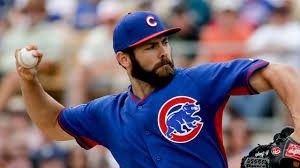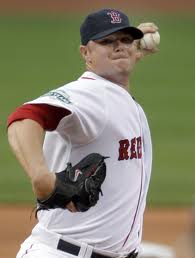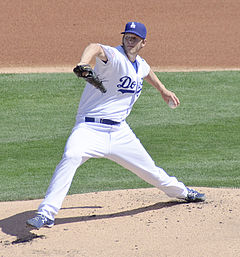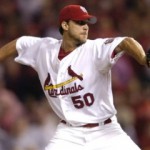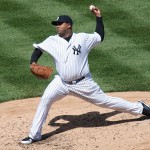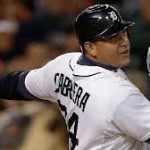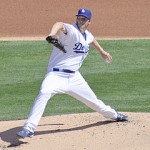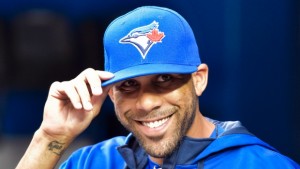
He looks pretty good in Canadian blue. Photo via ctvnews.ca
It was by most accounts the busiest trade deadline ever. Lots of high impact players moved. And we were worried that the 2nd wild card would curtail the trade market!
Here’s a couple of good summary links: a division-by-division overview of teams post-deadline, BaseballAmerica.com’s Trade Central, with a review of every 2015 trade, and a nice trade-by-trade grade at Minorleagueball.com.
Lets look at those teams that altered their rotations and talk about how much they improved. In order of perceived impact:
1. Los Angeles: added Mat Latos and Alex Wood, replacing two placeholders who had taken over for the injured Brandon McCarthy and Hyun-Jin Ryu. Add Latos and Wood to what the Dodgers were already rolling out and I feel like they have become the new team to beat in the NL.
2. Toronto: adds the best pitcher on the market David Price to a team that really, really needed a bump in their pitching. Price is used to the AL East and gives Toronto (coupled with their big Troy Tulowitzki move) a leg up on their divisional rivals. The rest of the division mostly stood pat in terms of the trade deadline, and the division is there for the taking. I believe Toronto can catch the Yankees; they’ve been incredibly unlucky by RS/RA and should regress upwards.
3. Kansas City: Johnny Cueto immediately replaces the injured Jason Vargas in a “nice timing” move, and KC solidifies its grip on the division. This move wasn’t about getting to the post season as much as it was about winning once they get there. Cueto is their 2015 version of James Shields; the workhorse who they can lean on in the 5- and 7-game series.
4. Houston: added Scott Kazmir and Mike Fiers, who will slide in to the 4th and 5th spots and supplant the under performing Scott Feldman and others who need more time in AAA. While not as flashy as some other teams’ moves, this makes the back of Houston’s rotation stronger. And, it should be noted, Houston’s main AL West rival (Los Angeles) not only didn’t make a move but just lost one its key starters to injury (C.J. Wilson). Houston’s rebuilding plan looks like its at least a year ahead of schedule and coupled with serious injury issues to their competitors look like the favorite in the AL West.
5. Texas: adds Cole Hamels, who Philadelphia *finally* moved after sitting on the pot for 2 years. I think this move is more about 2016; I don’t really see Texas making a move in 2015. But it is a significant move: Hamels could give Texas one of the best AL 1-2 punches when Yu Darvish comes back, and then they have a nice collection of arms to choose from to fill out the rotation (Gallardo, Holland, Perez, Lewis, Martinez).
6. San Francisco adds the underrated Mike Leake, who slides into the #3 spot, prevents the Giants from even considering using Tim Lincecum in the rotation any longer, and certainly gives them an upgrade over what they were getting from Tim Hudson. SF isn’t *that* far back from LA in the division … but more importantly is working hard to secure a WC spot.
7. Pittsburgh makes a minor move in adding J.A. Happ, who slides nicely and fortuitously into the spot that A.J. Burnett may be giving up to injury.
8. Chicago Cubs curiously added Dan Haren to their rotation; adding a mediocre #5 starter to a team that plays in a hitter’s park may back fire. I would have thought Chicago would have been more aggressive to try to secure the 2nd wild card, but then again is it fair to say their rebuilding plan is also a year ahead of schedule right now? Maybe they go big in the off-season to add starters behind Lester/Arrieta.
Sellers and the Impacts to their rotations:
– Detroit moved backwards, selling their ace but acquiring a good prospect in Daniel Norris. This move also lets them try out a couple of starter prospects for the rest of a season where they’re clearly not going to catch Kansas City.
– Oakland was a seller but didn’t augment their rotation very much, getting a #5 starter in Aaron Brooks. Oakland has been completely snake-bit this season, sporting one of the best run differentials in the game but having lost 75% of the one-run games they’ve played. Billy Beane isn’t afraid to deal though and he’s got more than enough starting pitching coming off injury to compete in 2016.
– Philadelphia got the rotting corpse of Matt Harrison in return for Hamel, along with a whole slew of players; I doubt Harrison ever pitches for them.
– Cincinnati sold off their two best pitchers and now are doing open auditions at the MLB level for their 2016 rotation.
– Miami finds themselves in a familiar place, selling off assets so as to line the pockets of their owners needlessly. They lose two rotation guys but augment from the D/L and the farm system. They’ll regroup for 2016 and continue to challenge as the worst organization to their fan base.
– Seattle was sort of a seller, flipping off back of the rotation guys for spare parts. They did not meaningfully alter their core rotation. Their problem is simply under-performance.
– Atlanta curiously parted with one of the most valuable resources in the game; the effective MLB-minimum starter. They ended up with draft picks and prospects and a Cuban wild card in Hector Olivera.
– Milwaukee parted with a 5th starter, giving those starts to their #1 prospect Taylor Jungmann. A good deal for them.
